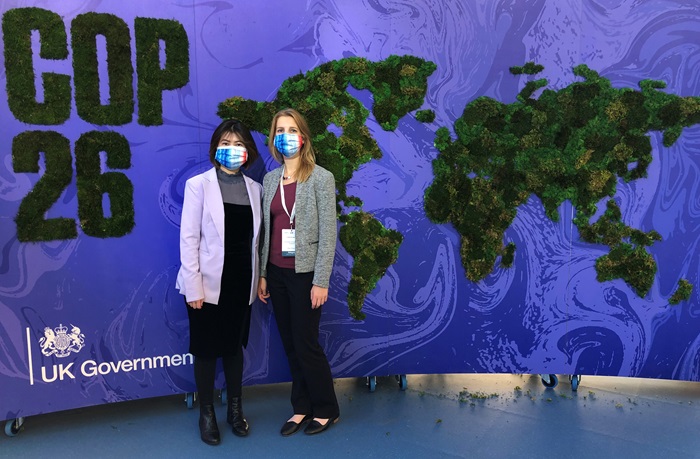
Net Zero Pension Summit
On Tuesday, the Ortec Finance’s COP26 team attended the Net Zero Pension Summit. Faith Ward, chair of the Institutional Investors Group on Climate Change (IIGCC), and various large UK asset owners, made valuable contributions. They made strong points underlining the importance of setting net-zero by 2050 targets and the importance of collaboration between investors, regulators, and governments to reach them.
Ward challenged the audience to imagine a global society with warming above 2oC (globally). ‘There is no fiduciary duty, if you do not have a functioning society. Investors have no excuse for not declaring a net zero target.’ She added that the transition towards net zero ‘is not likely to be smooth’.
It was stressed that, understanding systemic risk is crucial for highly diversified investors. In the conversation, the need to understand the impacts of an Implied Temperature Rise score (ITR) of 4oC, a reality that we may be facing if we don’t act, was stressed. This is why setting a net zero target is crucial, according to the speakers. To soften this dire warning, it was stated that moving to net zero ‘is a transition, not a cliff-edge’. It does not mean carbon-heavy emitters should be sold off now. The speakers remain firm believers in engagement, especially via collaborative efforts such as Climate Action 100+.

Achieving net zero ‘will take collaboration at a level unseen before between industry, government, and regulators’ a panelist asserted. Together, these actors have to create ‘a series of incentives to make it easier and more profitable to invest in companies that are part of the solution and away from companies causing the problem. Not just about a quick transition, but also a transition that lasts. It needs to be just’.
Some attendees were a bit more prosaic and highlighted that reaching net zero by 2050 implies complete fossil fuel phase out by 2036. As a result of that, investors should be taking a closer look at tail risks.
Willemijn Verdegaal of Ortec Finance’s Climate & ESG Team, looks back with appreciation on the event. However, there was a level of ambiguity in the discussions which remained unresolved. “Net zero target setting will drive a paradigm shift. The majority of fossil fuels will need to be phased out soon. Some speakers at the event stated that this would have to happen by 2036. If you consider the time, even from just a practical and technical perspective, required to re-tool the world’s energy system, then 15 years is an incredibly short amount of time. Dropping off a cliff-edge is putting it mildly. It is hard to reconcile this sharp trajectory with the smooth transition and stewardship narrative. Some very large Dutch pension funds have also reached this conclusion as illustrated by the recent fossil fuel divestment announcements from APG and PME”.
In short, a very interesting afternoon and the discussions illustrated that not all the answers are there yet. The challenge of the coming years will be to reconcile the speed of transition required to meet science-based, credible, net zero targets with the vision of making it smooth and just, according to Verdegaal.
Another Reality Check
In a blog by the International Energy Agency (IEA), they expressed enthusiasm about the new pledges made in the first week of COP26. They mentioned that ‘all the climate pledges announced to date, if met in full and on time, would be enough to hold the rise in global temperatures to 1.8°C by 2100.’ Also mentioned was that 40 percent of the measures required to get to net zero by 2050 - which is vital to that plateau of 1.8°C - are already there, and are affordable and scalable.’
To reach net zero by 2050, according to the IEA, 60% of the measures have to be innovative and out-of-the-box thinking such as new ways for heating, decentralized energy solutions, energy storage, and other ways of thinking about upcycling and reusing. For that the world needs: $122 billion USD of innovation capital, talented engineers, and scientists. But IEA sees a huge financial incentive with the biggest opportunities for the first movers.

As stressed at the Net Zero Pension Summit, it will take an unprecedented collaboration between private and public sector, which means that not only do innovation and investments have to speed up, but also more money for education and research will be needed.
Investments in moon shot climate solutions are more needed than ever. The Climate Action Tracker (CAT), one of the world’s respected climate analysis coalition, came with a hugely disappointing assessment report on Tuesday. CAT foresees that global temperature rise will top 2.4oC by the end of this century, based on the short-term goals countries have set out.
In its report CAT shows that 122 countries have submitted new NDC targets (including EU27). Of those countries, 22 have submitted stronger NDC targets while 11 did not increase ambition. As CAT does not analyze all countries worldwide yet, of the unanalyzed countries, 89 have submitted new NDC targets while 42 countries have not.
The report shows that one of the goals of COP26 is to have a system that regulates how countries measure and report on their emissions, which is going to be a tough nut to crack.

Thinking through the financial impacts of various climate risk scenarios and creating a net-zero roadmap may feel somewhat overwhelming. At Ortec Finance, we are here to help. Don’t hesitate to reach out to us, or take a look at our Climate & ESG solutions page.
Contact




.png?w=576&hash=ACDB68A89AC45F798869837DDC9018AE)






